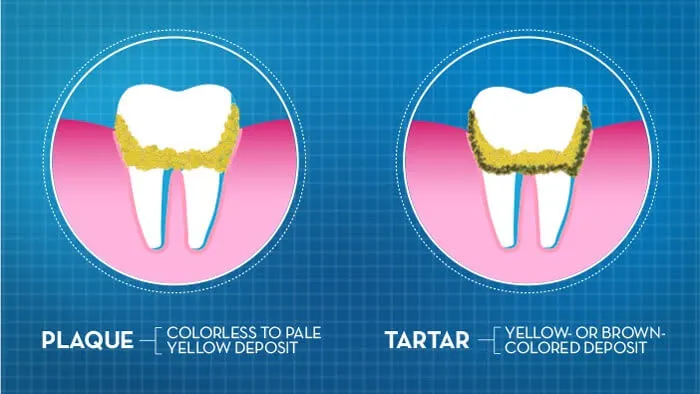Dental Plaque and Tartar: What Is It, What are the Causes, How to Remove, Treat and Prevent

Plaque is an extremely sticky, colorless to pale yellow deposit of biofilm that regularly forms on your teeth.
Everytime you eat or drink, there it is! Although it is extremely common, plaque on teeth needs to be cleaned
and removed on a regular basis- failing which it can turn into somthing serious and damage the teeth. But before
we know what causes is, let us discuss what exactly dental plaque is.
Good oral care routine is your absolute best measure against plaque and tartar formation. However, if it is severe then there are some treatments available for removing plaque from teeth you can consult your dentist for:
What is Dental Plaque?
When saliva, food, and fluids combine they produce bacteria deposits, which collect where the teeth and gums meet. Plaque contains bacteria, which produce acids that attack your tooth enamel and can damage your gums. If not treated, the damage could become permanent. When plaque accumulates and is not removed, it can mineralize, trapping stains and turning into tartar. Plaque is the root cause of many oral health issues. The most effective way to get rid of plaque is by using an electric toothbrush.What is Tartar?
Tartar is a yellow or brown colored deposit that forms when plaque mineralizes on your teeth. Susceptibility to tartar build up varies greatly depending on the individual person. Generally, as you age, you become more prone to having tartar form on your teeth.Tartar buildup bonds strongly to enamel and can only be removed by a dental professional. If you start seeing any signs of plaque or tartar buildup, be sure to seek treatment immediately.The difference between Plaque and Tartar
One often confuses plaque and tartar- although they are related to each other, they aren't interchangeable terms. Plaque is the thin, sticky coating that forms on the surface of the teeth when mouth bacteria interacts with tiny leftover food particles. On the other hand, tartar is what plaque hardens into if neglected for a long time. Plaque is often whitish in colour, but once it hardens into tartar, it can become brown or even black and stain the teeth. Now that you know the difference, let us learn what actually causes plaque and tartar.Good oral care routine is your absolute best measure against plaque and tartar formation. However, if it is severe then there are some treatments available for removing plaque from teeth you can consult your dentist for:
- Fluoride treatments to stop tooth decay and slow down the bacteria
- Medications to counteract dry mouth and increase saliva production
- Antibacterial, dental-approved mouthwash
- Dental sealants to prevent plaque formation